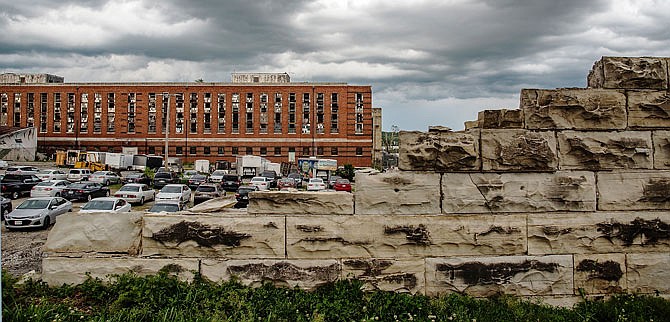After several historic buildings at the Missouri State Penitentiary in Jefferson City sustained significant damages during last month's tornado, state and local officials are deciding what the next steps should be.
The state conducted two structural engineering assessments at the Missouri State Penitentiary after the May 22 EF-3 tornado, said Brittany Ruess, Missouri Office of Administration director of communications.
The tornado caused roof and structural damage to Housing Units 2 and 4, Ruess said. Housing Units 1 and 3, as well as the dining hall and gymnasium, sustained roof damage.
The twister tore down the north and south sections of the historic wall.
A metal building, which is not historic, was "a complete loss and will need to be demolished," Ruess said in a Monday email to the News Tribune.
The state also demolished a damaged guard tower that was part of the damaged wall along East Capitol Avenue, Ruess told the News Tribune last month.
The state is still working on cost estimates, Ruess said.
"We are still assessing the site and have not yet made a determination about how to move forward with the MSP," she said.
The Jefferson City Convention and Visitors Bureau suspended its Missouri State Penitentiary tours after the tornado. The tours are canceled through Aug. 31, said Brittney Mormann, CVB communications and film manager.
"At this time, we are still unable to make any further decisions regarding the tours as OA is still determining how to move forward," Mormann said.
The CVB anticipates losing about $217,900 in revenue June through August, Mormann said. This amount includes private and public tours, as well as promotional items that would have been sold during those months.
The Missouri State Penitentiary attracted about 33,500 people in 2018, Mormann said earlier this year.
The old prison shoe factory, part of the city's nearly 32-acre redevelopment site, also sustained tornado damage, Ruess said.
Jefferson City Mayor Carrie Tergin said she was unsure of the extent of the tornado damage to the building, especially since the old shoe factory was already deteriorating.
The city and state will continue to partner as they move forward with assessing the tornado damage, she said.
City officials plan to redevelop 31.28 acres at the Missouri State Penitentiary, which does not include the historic buildings used for the CVB's prison tours. The historic buildings will remain in the state's possession.
During a closed session meeting Tuesday, the Missouri State Penitentiary Community Partners reviewed developers' qualification applications, which were due by May 17.
Tergin said the committee selected a few project developers during the meeting and the committee plans to interview them before selecting the final redeveloper. The city will announce the finalists sometime later this week, she added.
The city must select a developer within two years of the conveyance and start construction within four years, according to the agreement between the state and city.
Former Gov. Eric Greitens signed legislation conveying 31.28 acres of the old prison to Jefferson City two years ago. The state and city finalized the conveyance last summer.
The redevelopment site is between the historic site and Chestnut Street, including some right-of-way areas and the old shoe factory.
Primary proposed uses for the site include hotels, entertainment venues, office buildings, museums and convention centers, according to the agreement between the city and state. Developers could also construct secondary uses such as full-service and fast-casual restaurants, bars, coffee shops and retail establishments, as long as these features do not exceed 10,000 square feet each.
Developers could also build parking structures, green spaces and pedestrian plazas on the site.
Traditional fast-food restaurants, retail or restaurant establishments with drive-thru facilities, an enclosed shopping mall, and other residential uses other than condominium units and loft-style apartments are not permitted, according to the agreement.
All structures and improvements must be of similar style to the existing Missouri State Penitentiary historic structures, the agreement states.

